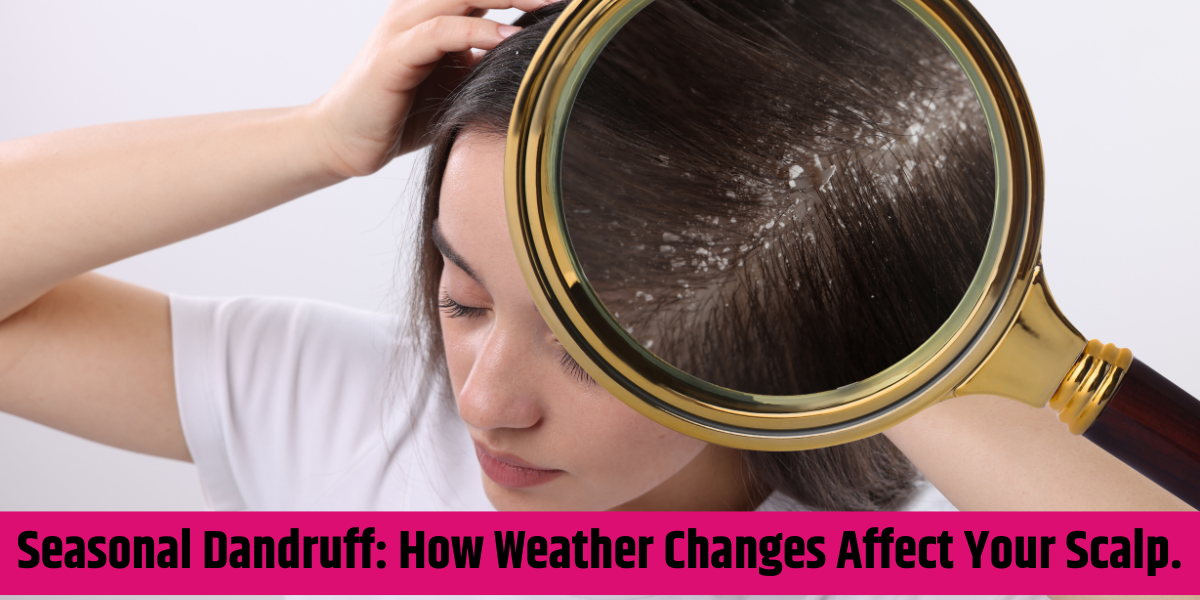Seasonal Dandruff: How Weather Changes Affect Your Scalp.
Seasonal dandruff is a common issue where changes in weather, like cold winters or humid summers, affect the health of your scalp. These shifts can lead to dryness, oiliness, and increased flakiness, making dandruff more noticeable. Understanding how weather impacts your scalp can help you manage dandruff effectively throughout the year.
Dandruff is a common scalp condition that affects millions of people, and weather changes can play a significant role in its flare-ups. According to Dr. Priyanka Tambe, a leading skin specialist in Kharadi at Dermadent Laser Clinic, seasonal changes like cold winters or humid summers can worsen dandruff symptoms by affecting the moisture levels of your scalp. Understanding how these environmental factors influence your skin can help you better manage dandruff throughout the year.
Why does dandruff get worse in the winter?
In the winter, cold air combined with indoor heating can dry out the scalp. The lack of moisture can lead to increased flakiness and irritation, worsening dandruff symptoms. The scalp produces more oil to compensate for the dryness, creating a perfect environment for Malassezia, the yeast-like fungus responsible for dandruff, to thrive
Can hot weather cause dandruff?
Yes, dandruff can also worsen in hot weather. High humidity and heat can cause your scalp to sweat more, which can lead to a buildup of oils and dead skin cells. This, in turn, increases the chances of fungal growth, which is one of the primary causes of dandruff. Additionally, the scalp may become irritated from sun exposure, leading to flaky, itchy skin.
How can I prevent dandruff during seasonal changes?
To manage seasonal dandruff, it’s essential to adapt your scalp care routine. In winter, focus on moisturizing shampoos and conditioners to prevent dryness. During the summer, use a clarifying or anti-dandruff shampoo to manage oil production and fungal growth. Maintaining a balanced diet rich in vitamins and staying hydrated can also support scalp health.
Does dandruff increase in the monsoon season?
The monsoon season is notorious for worsening dandruff due to increased humidity. Excessive moisture in the air creates a breeding ground for fungi, causing your scalp to become oily and more prone to dandruff. Wearing breathable headgear and washing your hair frequently with an antidandruff shampoo can help minimize the impact.
Can dry air from heaters cause dandruff flare-ups?
Yes, the dry, warm air from heaters used during colder months can strip your scalp of its natural moisture, leading to dryness and flakiness. This results in a flaky scalp, which can sometimes be mistaken for dandruff. However, the dryness can trigger a fungal response, leading to actual dandruff over time. Using a humidifier indoors can help maintain moisture in the air, reducing scalp dryness.
Is there a link between seasonal allergies and dandruff?
Yes, seasonal allergies can sometimes exacerbate dandruff. Allergens can cause scalp irritation, leading to itching and flaking. Whoever suffers from the condition seborrheic dermatitis may experience flare-ups during allergy seasons due to the inflammatory response triggered by allergens.
What ingredients should I look for in anti-dandruff shampoos for seasonal care?
Look for shampoos with ingredients like:
Zinc Pyrithione: Reduces fungal growth.
Salicylic Acid: Helps remove dead skin cells.
Ketoconazole: Fights fungal infections.
Tea Tree Oil: Natural antifungal properties that soothe the scalp. Switching between moisturizing and anti-dandruff formulas depending on the season can also be helpful.
Can diet help with seasonal dandruff?
Yes, your diet plays a significant role in scalp health. A diet rich in antioxidants, omega-3 fatty acids, and zinc can help reduce inflammation and promote a healthy scalp. Drinking plenty of water and eating foods rich in vitamins B and D can help your scalp maintain its natural moisture, reducing the risk of seasonal dandruff flare-ups.
How often should I wash my hair if I have seasonal dandruff?
In winter, it’s essential to keep your scalp moisturized, so washing your hair every 2-3 days with a gentle or moisturizing shampoo is ideal. In summer or humid conditions, you might need to wash your hair more frequently (even daily) with an anti-dandruff shampoo to prevent oil and sweat buildup.
Can sun exposure reduce dandruff?
Moderate sun exposure can help reduce dandruff since sunlight can suppress the growth of Malassezia fungus. However, too much sun can damage the scalp, leading to irritation and peeling skin that mimics dandruff. Always protect your scalp with a hat or sunscreen to prevent sunburn, especially during peak hours.
As Dr. Priyanka Tambe from Dermadent Laser Clinic explains, seasonal dandruff is a manageable condition once you understand the triggers. Whether it’s the dryness of winter or the humidity of summer, adjusting your hair care routine, staying hydrated, and using the right products can help you keep your scalp healthy. For those struggling with persistent dandruff, consulting a skin specialist in Kharadi can provide personalized treatment options.


